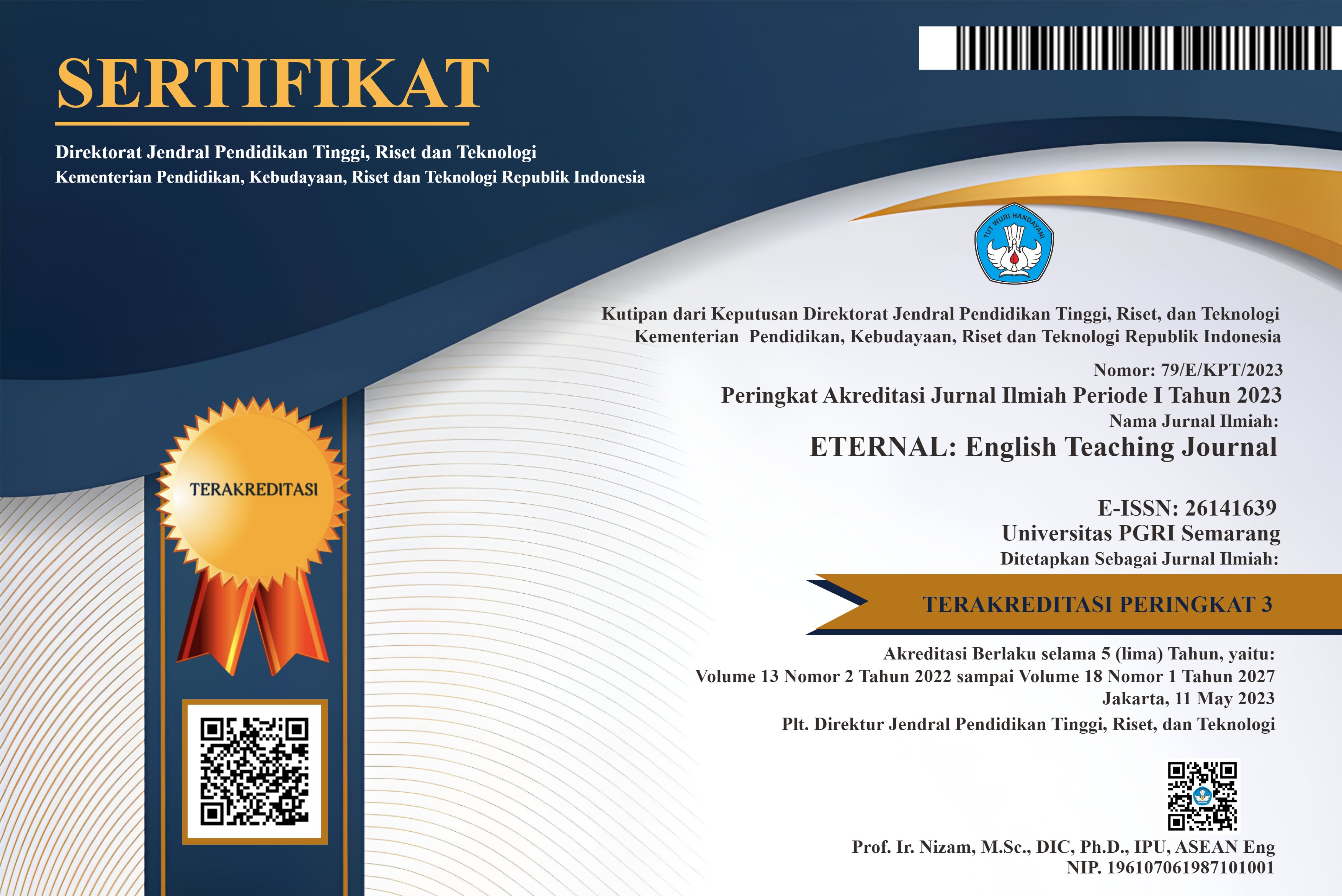Assessment on Qualitative Research in Language Education: Perspectives from Thesis Supervisors
DOI:
https://doi.org/10.26877/eternal.v16i1.1237Keywords:
language education, qualitative research, thesis supervisorsAbstract
This study aims to examine assessment strategies employed by thesis supervisors in assessing their students qualitative research, and to explore the thesis supervisors’ perceptions of their assessment strategies. Conducted in an Indonesian university, this study adopted an explanatory sequential design of mixed-research by using a purposive sampling technique to recruit ten thesis supervisors as the research participants. The findings showed that the supervisors made a total of 1,002 feedback comments on the 20 thesis drafts. The feedback comments focused on five different aspects of students’ theses including research components (58.98%), coherent and cohesion (22.32%), grammatical accuracy (10.27%), vocabulary used (4.49%), and reference and citations (3.89%). Meanwhile, data gained from interview sessions revealed four dominant themes in supervisors’ perceptions of their assessment strategies including instructional scaffolding, time efficiency, students’ engagement, and researcher independence. Despite some limitation such as limited number of participants and inadequate research instruments, this study provides pedagogical implication including the necessity to facilitate students with relevant trainings to help improve their thesis writing skills. Suggestions for future research are also presented.
References
Arifin, Z. (2020). An Analysis of written feedback from teachers on the writing of students’ composition. Language-Edu, 9(1), 1-10.
Bitchener, J. (2018). A guide to supervising non-native English writers of theses and dissertations. New York & London: Routledge.
Bukhari, N., Jamal, J., Ismail, A., & Shamsuddin, J. (2021). Assessment rubric for research report writing: A tool for supervision. Malaysian Journal of Learning and Instruction (MJLI), 18(2), 1-43.
Cekiso, M., Tshotsho, B., Masha, R., & Saziwa, T. (2019). Supervision experiences of postgraduate research students at one South African higher education institution. South African Journal of Higher Education, 33(3), 8-25.
Gorman, M., & Ellis, R. (2019). The relative effects of metalinguistic explanation and direct written corrective feedback on children’s grammatical accuracy in new writing. Language Teaching for Young Learners, 1(1), 57-81.
Lee, I. (2019). Teacher written corrective feedback: Less is more. Language Teaching, 52(4), 524-536.
Lei, Z., & Pramoolsook, I. (2020). Written supervisory feedback strategies on bachelor's theses: Chinese EFL supervisors' beliefs and practices. rEFLections, 27(2), 162-188.
Hawari, O. M. D. A., Al-Shboul, Y., & Huwari, I. F. (2022). Supervisors' Perspectives on Graduate Students' Problems in Academic Writing. European Journal of Educational Research, 11(1), 545-556.
Hyland, K., & Hyland, F. (Eds.). (2019). Feedback in second language writing: Contexts and issues. Cambridge university press.
Link, S., Mehrzad, M., & Rahimi, M. (2022). Impact of automated writing evaluation on teacher feedback, student revision, and writing improvement. Computer Assisted Language Learning, 35(4), 605-634.
Neupane Bastola, M., & Hu, G. (2021). Supervisory feedback across disciplines: Does it meet students’ expectations? Assessment & Evaluation in Higher Education, 46(3), 407-423.
Nouri, J., Larsson, K., & Saqr, M. (2019). Bachelor thesis analytics: Using machine learning to predict dropout and identify performance factors. International Journal of Learning Analytics and Artificial Intelligence for Education, 1 (1), 116-131.
Nurkamto, J., & Prihandoko, L. A. (2022). Students' problems of academic writing competencies, challenges in online thesis supervision, and the solutions: thesis supervisors' perspectives. TEFLIN Journal: A Publication on the Teaching & Learning of English, 33(1), 123-147.
Paltridge, B., & Starfield, S. (2019). Thesis and dissertation writing in a second language: A handbook for students and their supervisors. Routledge.
Roberts, L. D., & Seaman, K. (2018). Good undergraduate dissertation supervision: perspectives of supervisors and dissertation coordinators. International Journal for Academic Development, 23(1), 28-40.
Ryan, T., & Henderson, M. (2018). Feeling feedback: students’ emotional responses to educator feedback. Assessment & Evaluation in Higher Education, 43(6), 880-892.
Tan, F. D., Whipp, P. R., Gagné, M., & Van Quaquebeke, N. (2019). Students’ perception of teachers’ two-way feedback interactions that impact learning. Social Psychology of Education, 22, 169-187.
Xu, L., & Hu, J. (2019). Language feedback responses, voices and identity (re) construction: Experiences of Chinese international doctoral students. Innovations in Education and Teaching International, 1-12.
Yenus, N. (2020). Graduate students’ perceived needs and preferences for supervisor written feedback for thesis writing. Journal of Language and Education, 6(4 (24)), 153-170.
Zheng, Y., Yu, S., Wang, B., & Zhang, Y. (2020). Exploring student engagement with supervisor feedback on master ’s thesis: Insights from a case study. Innovations in Education and Teaching International, 57(2), 186-197.







